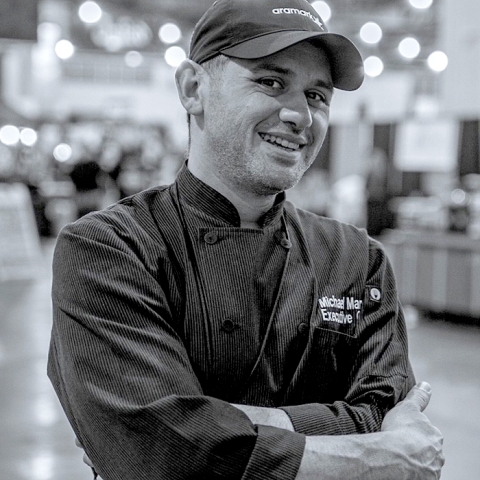Taste Trends: Mike Mantia, Senior Executive Chef, Aramark at Pennsylvania Convention Center

Talk to Chef Mike Mantia about how he found his way into the culinary world and he’ll tell you the story of a young teen who loved the hustle and bustle of a kitchen so much, he never looked back once he fell into the profession.
Born in the U.S. to Sicilian parents, Mantia’s culinary training started early at his grandmother’s side, learning to roll meatballs at the ripe old age of five. His burgeoning passion for food became further cemented once he discovered the wonder of cultivating herbs, greens, vegetables and fruit in grandfather’s garden, an experience that instilled in him a broader sense of the inextricable link between food and family.
A true “lifer” in the culinary arts, Mantia’s professional experience demonstrates a successful career built through hard work, progressive responsibility, enthusiasm and achievement. He has worked at a range of high-profile venues, including Lincoln Financial Field, and has assisted with The World Series at Citizen’s Bank Park for the champion Philadelphia Phillies, the Stanley Cup finals for the Philadelphia Flyers and the playoff frenzy surrounding the Philadelphia Eagles.
Now, as senior executive chef for Aramark at Philadelphia’s Pennsylvania Convention Center, where he worked his way up from sous chef and has spent more than 12 years of his career, Mantia oversees hundreds of events each year, ranging from single specialty meals for the numerous actors, musicians and politicians who pass through the venue annually to unique receptions, custom buffets and exceptional plated meals for groups tallying their guest count in the thousands.
Corporate Event News had the opportunity to speak with Mantia about what’s in and what’s out in event food and beverage, and how event planners can work with venue chefs to craft delicious and on-trend menus, even on squeaky-tight budgets.
What are the biggest and most exciting food and beverage trends that you’re seeing?
We are seeing requests for fermented beverages, health-conscious and plant-based foods at increasing rates—primarily as a result of what we’ve learned is an attempt to lose some of the “pandemic weight.” As guests are now venturing out of their homes more often, they are looking for healthier food options. So, we’re being creative with trends such as low-calorie, high-protein plant-based foods, as well as kombucha, which is said to help boost metabolism. These are just some of the ways we’re accommodating guests and keeping them interested and excited about the options.
Breakfast and continental breakfast offerings have turned “trendy” for multiple reasons. Again, with health seemingly being the biggest factor and budgets being the second, starting the day off right at a convention with items that contain just the right amount of caffeine—including Power Bars made in-house containing, coffee, peanut butter, chocolate, oats, flax seeds, almond flour and dried cherries, paired with a seasonal fruit-infused Kombucha—guests are fueled with enough energy to sit through a long learning session.
What are some pre-COVID trends that are no longer hot and why?
Popular interactive buffet and build-your-own trends like sundae bars, chocolate bars and s’mores, have declined given the difficulty in staying socially distant in buffet lines and food station setups. They don’t offer the COVID-friendly service that has become the norm.
Many event planners are going to be working with even tighter budgets when events fully resume. What are your top tips for overcoming this obstacle while still providing delicious fare for attendees?
The most difficult aspect of this is that the cost of goods has increased, while budgets have decreased and expectations have increased. The best advice is to keep menus simple and executed well. Producing meals with bold flavors, reduced portions and presentations that offer a wow factor seems to be the trend.
Prior to COVID, dietary-conscious menus (such as gluten-free, keto, vegan and vegetarian) were a big and growing trend. Is this still true and if so, do you foresee this accelerating in the future?
This still holds true, and it will continue to evolve. Social media is riddled with “influencers” that are sharing, showing and preaching the benefits of healthy trends. Visiting our convention centers and seeing that we are making a conscious effort to stay on trend and satisfy their needs is a big win for both parties.
What do you like most about working in the culinary arts?
Seeing the smiles on the faces of people eating the food you create is an incredibly satisfying feeling. What I like more is that I am always learning new things, meeting new people and given the opportunity to be mentored by—and mentor—other professionals in the field. It never gets boring.
Don’t miss any event-related news: Sign up for our weekly e-newsletter HERE and engage with us on Twitter, Facebook, LinkedIn and Instagram!


Add new comment